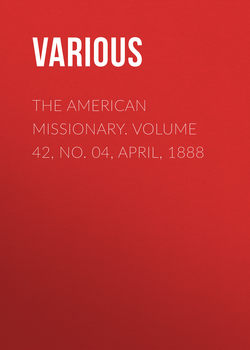Читать книгу The American Missionary. Volume 42, No. 04, April, 1888 - Various - Страница 4
THE AMERICAN MISSIONARY
American Missionary Association
A SERIOUS ALARM IN GEORGIA
ОглавлениеThe American Missionary is not published for the entertainment of its readers. It has a more serious purpose. It speaks for races who have suffered grievous wrongs, and for peoples whose condition is exceedingly sad. It has to do with tragic facts, and much of what it has to say must excite compassion, and must appeal both to the consciences of our readers and to their sense of duty. To call upon those whom God has blessed, to insert themselves into the woes and spiritual wants of others who need their help, is grave and serious.
This is one feature. There are others. The joy of the work and the joy of the worker, which we are called to record, are a relief to the stories of necessity, and are like beautiful pictures painted upon the dark background. When "Our eyes have seen the glory of the coming of the Lord," we can for the time forget the darkness upon which the light shines, and sing our hallelujahs. If it is saddening to tell of the night, it is cheering to mark the fact that the providences of God are working out his promises, and are surely bringing in God's day.
Over and above the evils to which we must call earnest heed, the dangers which are not far away, and the exigencies of the cause of Christ, we are sure that no one can read the MISSIONARY without being cheered and quickened in gratitude to God for what he is graciously doing for his needy ones through his people.
With the serious duty on the part of those who are working together with God for the salvation of men, there drift along in the current of his providences certain incidents that are exceedingly droll.
As we have seen some very ludicrous manifestations of character and conduct in the terrible struggles of a battlefield, and have brushed aside our tears at times for an irrepressible bon mot in a hospital, so in the weighty and solemn considerations which continually appeal to us, and while we are anxiously asking how we can make the most bricks for the Lord's building with the least straw, incidents arise which not only throw light upon our serious work, but which are irresistibly amusing.
We think we should share with our readers a recent one which, when we read it in the detail, impossible to be repeated here, made us smile. Every time we re-perused it we thought it, as Alice in Wonderland said, "curiouser and curiouser."
Our readers are not strangers to the name and fame of the leading editor of the chief paper in Georgia. They have heard of him as an eloquent orator with a brilliant imagination which saw a New South in almost millennial array, and told of it with an enthusiasm so contagious that to the sons of the Pilgrims after the fulness of a great dinner it seemed that the "Promised day of Israel" had at last arrived. It is true that when this dinner had been thoroughly digested, certain ones, removed from the afflatus of the occasion began to ask, "Are these things so?" And when the Glenn Bill sought the endorsement of public opinion, and substantially received it with no word of reprobation from the eloquent orator and editor, some recalled the speech of Sheridan in reply to Mr. Dundas, "The right honorable gentleman is indebted to his imagination for his facts."
In all this time no one suspected the Atlanta Constitution of possessing the humorous character which it has lately revealed. In late issues of February it has, in the garb of gravity, about two columns that are ridiculously funny.
It appears that Prof. Sumner Salter, a graduate of Amherst College, a son of an honored pastor of Iowa, a musical director of exceptional gifts and a teacher of eminent ability, was solicited by parties in Atlanta to take his residence there in the interest of the musical cultivation of such as could secure his services. He soon attracted the patronage of society, and all went smoothly until the tempter came. Alas, there was a serpent in Eden, so there was a skeleton in the closet of the Atlanta Constitution. It was a dreadful skeleton. The Constitution seriously publishes the fact that "it was whispered about for some time," until patience ceased to be a virtue, when it sent a guardian of public safety in the form of a reporter to investigate. "Was it really true that a white man who was giving music lessons to white people was also teaching a colored class at another time and place? If so, what about the New South? The black man had no business to be black, but he was all the same, and being so what right had Prof. Salter to teach colored people to sing? Let the matter be thoroughly searched out. The reporter departed on his mission, with a countenance more in sorrow than in anger, and returned vice versa.
"'Tis true, 'tis pity,
And pity 'tis 'tis true."
The professor was actually doing this very absurd thing. He had taken charge of a colored class in the church of which Rev. Evarts Kent is minister and was teaching them how rightly to use the talents with which God had so richly endowed them.
Accordingly, in the year of grace 1888, the Atlanta Constitution publishes the astounding fact, and calls the world to heed it, in conspicuous head lines:—
"WHITE OR BLACK—A PROMINENT MUSICIAN WHO TEACHES BOTH COLORS—HIS BUSINESS SAID TO BE INJURED."
